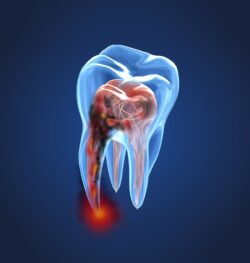 Because they’re so strong, you may think that teeth are invulnerable to injury, but even strong, healthy tooth enamel can be damaged. Dr. Brent Engelberg of AH Smiles in Arlington Heights, IL has seen many dental first aid patients and has some advice on how to handle the more common accidents, including what to do before you even leave for the dentist’s office.
Because they’re so strong, you may think that teeth are invulnerable to injury, but even strong, healthy tooth enamel can be damaged. Dr. Brent Engelberg of AH Smiles in Arlington Heights, IL has seen many dental first aid patients and has some advice on how to handle the more common accidents, including what to do before you even leave for the dentist’s office.
How Can Teeth Get Injured?
There are several ways that teeth can be injured, some more severe than others, but all injuries need to be addressed quickly to preserve your oral health. More severe injuries like blows to the face or teeth during sports, auto accidents or assaults will need to be evaluated immediately by a health care provider. If your injury is associated with severe trauma, seek emergency medical attention right away. Most hospitals have on-call oral surgeons to handle severe injuries like jaw fractures, emergency tooth removal, or reconstruction of the dental arches.
Fortunately, these are not as common as less severe dental injuries, such as cracks, chips, or teeth getting knocked out without blunt trauma. Chewing or biting down on hard objects, especially things not intended for chewing, is frequently a cause of injury. This is especially likely if the tooth is already damaged from tooth decay. These issues can usually be addressed at home before you can get in to see your dentist, but it’s important to request an emergency appointment as soon as possible.
What to Do in a Dental Emergency
- If the injury was a result of an auto or sports accident, or if there was blunt force trauma, seek immediate medical attention in an emergency room or health care provider. Do not wait to see your dentist.
- For a cracked tooth, rinse your mouth with warm water to keep the area clean. You may also experience some swelling, which you can reduce by placing cold compresses on the face. Cracked teeth are much more susceptible to bacterial infection, so keeping the area clean until the tooth can be repaired is essential.
- For a knocked-out permanent tooth, keeping the tooth moist at all times will increase the likelihood of saving it. Gently place it back in the socket without touching the root, or place the tooth in a clean and sealed container of milk. Call your dentist immediately for an emergency appointment.
There may be swelling or bleeding associated with these injuries. To keep swelling down, apply cold compresses to the face. Over-the-counter painkillers can help reduce pain, but never apply aspirin directly to the affected area as it can thin the blood and prevent healing.
Avoiding Dental Injuries
You can prevent dental injuries by taking simple steps to protect yourself and your mouth.
- Always wear a mouthguard when participating in sports or recreational activities.
- Avoid chewing on hard foods that can crack teeth, especially items not meant for chewing such as pen caps, erasers, or finger nails.
- Never use your teeth to cut or tear open things.
Emergency Dental Care in Arlington Heights, IL
Most dentists keep a few openings in their schedules for dental emergencies, so if you need immediate dental care, call your dentist. Dr. Engelberg sees patients at his practice, AH Smiles, in the Arlington Heights/Chicago, IL area, so call (847) 230-9703 to schedule an appointment online.
